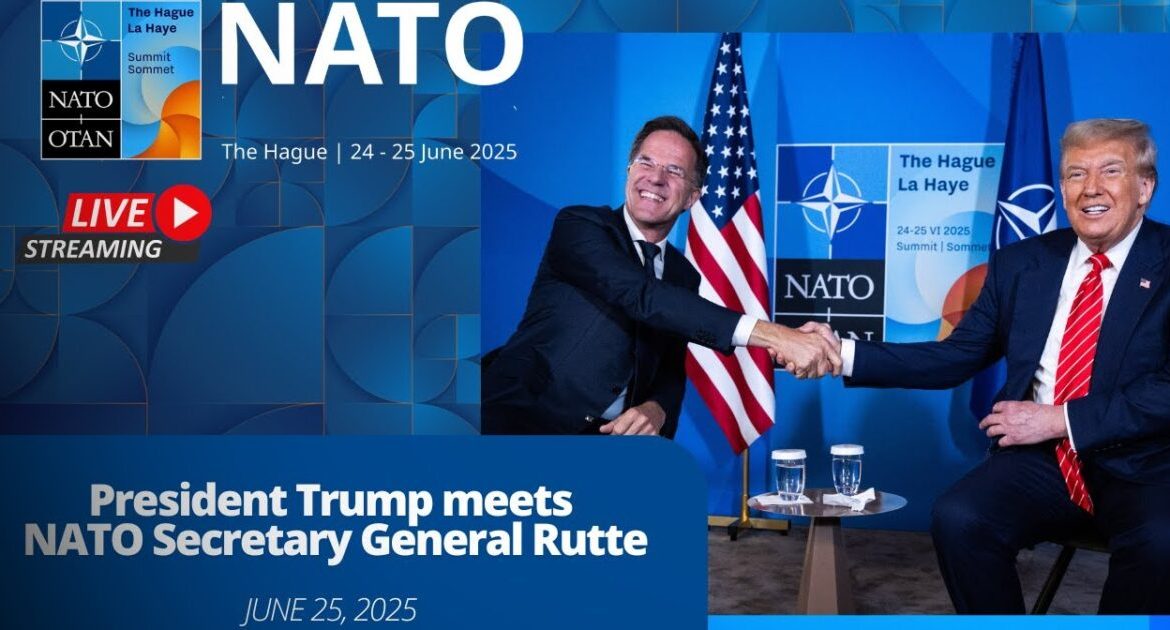
Trump Forces Europe to Pay Up: What This Means for Your Tax Bill and Your Paycheck


At the NATO summit, President Trump secured a historic deal that delivers direct benefits to the American people. Under the agreement, if European nations follow through on their pledge to raise defense spending to 5% of GDP, U.S. taxpayers will see real relief, lower out-of-pocket costs, increased domestic investment, more manufacturing jobs, and enhanced national security.
And, if the Europeans don’t make good on their promises, they know Trump will come down hard.
While the headlines focus on Europe’s military buildup and geopolitical implications, the breakthrough has concrete domestic effects. As European allies take greater responsibility for their own defense, the United States can reduce costly European defense commitments and redirect military assets to address the more pressing threat, China.
This shift also makes it easier for the U.S. to disengage from foreign entanglements like the war in Ukraine, which Europe will now be better positioned to manage without relying on U.S. troops or taxpayer money.
For decades, every American family has unknowingly subsidized Europe’s security. While Europeans enjoyed generous social benefits and early retirement, American taxpayers funded their defense. President Trump’s deal begins to correct that imbalance.
As NATO members increase their defense budgets, the U.S. can reinvest at home, rebuilding the industrial base and strengthening its global position. With Europe purchasing more American-made weapons, billions will flow back into the U.S. economy, creating well-paying jobs for American workers.
Defense manufacturing supports stable, middle-class careers. Companies like Lockheed Martin pay entry-level assemblers, no college degree required, $28.16 per hour, with higher wages for welders, machinists, quality inspectors, and engineers. These jobs often include full benefits: health insurance, retirement plans, and job security that outlasts economic downturns.
The impact extends beyond the factory itself. When Boeing opens a production line in Missouri, it fuels demand for local suppliers, truckers, cafeteria staff, and security personnel, supporting entire communities. In Lima, Ohio, the Army tank plant has more than doubled its workforce to over 850, with average pay around $41,000, about one-third higher than the city’s median income.
In Huntsville, Alabama, Redstone Arsenal employs over 143,000 people and drives a $27 billion economic impact. Jobs in research, engineering, and aerospace manufacturing average $80,409, 68% above the state average. Huntsville’s 2.4% unemployment rate is far below the national average, thanks largely to defense-sector stability.
Veterans especially benefit from the growth of the defense industry, as many contractors actively recruit former service members. Unlike industries that chase cheap labor abroad, defense manufacturing must remain in the U.S. for national security reasons. This guarantees stable, recession-resistant employment in communities that secure defense contracts, jobs that support families across generations and anchor local economies long-term.
Due to the need for continued interoperability of weapons and technology, European allies will likely depend on U.S.-made systems for decades, generating steady revenue from maintenance, spare parts, upgrades, and training. This not only ensures sustained employment for American workers but also reinforces America’s leadership in defense innovation.
Increased research and development driven by NATO demand will help the U.S. maintain its technological edge in fields like cybersecurity, artificial intelligence, and advanced manufacturing. Defense-related R&D often yields civilian breakthroughs, from GPS and the internet to brain-controlled prosthetics that restore mobility to paralyzed patients and wounded veterans, transforming both national security and everyday life.
The most satisfying part of Trump’s NATO victory is simple fairness. For decades, American taxpayers have subsidized the defense of socialist and pacifist European nations while they spent generously on free education, universal healthcare, and egregious welfare programs. Many European nations did away with conscription entirely, and those that kept it weakened the commitment, shortening service to as little as a few months.
Meanwhile, French workers enjoy six weeks of vacation while American defense contractors work overtime to fill Europe’s military gaps. Trump’s 5% defense commitment ends this one-sided arrangement. European taxpayers will finally shoulder their share of the burden. And it’s not just defense, alongside the NATO agreement come renewed trade negotiations, giving the U.S. leverage to fix lopsided trade deals and boost American exports to Europe. That means even more jobs and economic benefits for American workers.
The psychological impact is also important. Americans are sick of being the world’s unpaid security guard. Of course, there’s still a chance that Europe will back out of its commitments. But this NATO summit was highly public and widely covered by international media, which creates pressure. If European leaders fail to meet the spending requirements, they’ll lose face. They also know that Trump could reinstate tariffs or cut U.S. defense support, so there’s real motivation to follow through and actually rebuild their armies as promised.
The post Trump Forces Europe to Pay Up: What This Means for Your Tax Bill and Your Paycheck appeared first on The Gateway Pundit.
